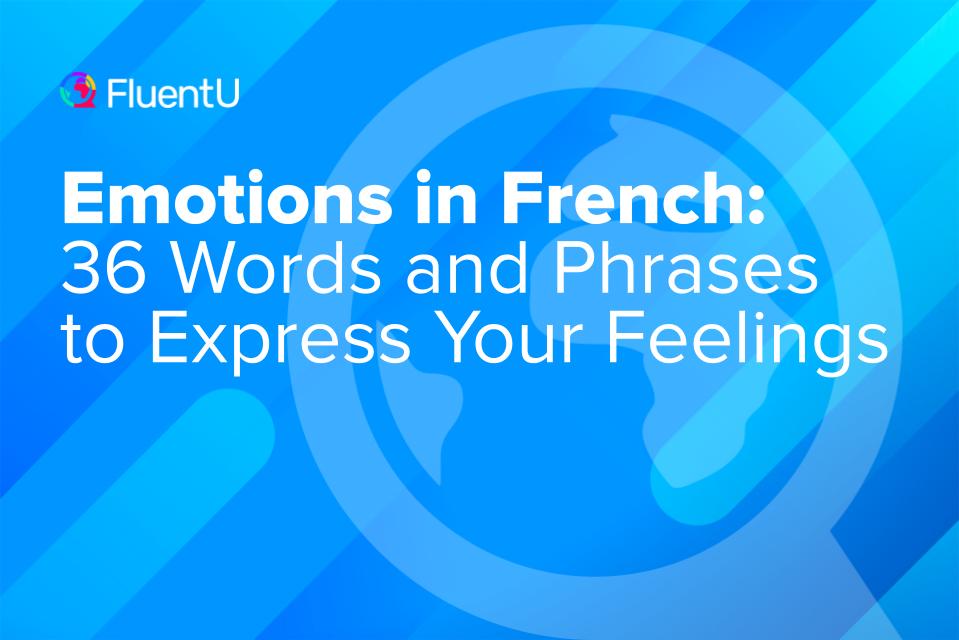Emotions in French: 36 Words and Phrases to Express Your Feelings

Learning to express your emotions in French is a step toward fluency. There is a lot of vocabulary for sharing how you feel: Whether you’re excited, annoyed or just curious about how someone else is doing.
The following words and phrases will add depth to your conversations. You’ll also pick up essential grammar rules, like how to make adjectives agree with their subjects.
You can also learn more about expressing your feelings with the FluentU French YouTube video below:
Download: This blog post is available as a convenient and portable PDF that you can take anywhere. Click here to get a copy. (Download)
Important French Feelings Grammar
Before we get started revealing how we really feel, there is one quick topic we need to touch on. You see, the main thing about adjectives (emotional ones included) is that they abide by subject-agreement rules. If you aren’t already familiar with the rules, let’s do a brief run-down:
Adjectives have four forms: masculine singular, feminine singular, masculine plural and feminine plural.
Depending on what your subject is, you may need to agree the ending of your adjective with it. When you’re done, everything should be matchy-matchy.
As an example, we’ll use the adjectives gêné (embarrassed) and heureux (happy):
Masculine singular: Il est gêné.
Feminine singular: Elle est gênée.
Masculine plural: Ils sont gênés.
Feminine plural: Elles sont gênées.
Masculine singular: Il est heureux.
Feminine singular: Elle est heureuse.
Masculine plural: Ils sont heureux.
Feminine plural: Elles sont heureuses.
These are the most common endings you’ll see when dealing with our emotional adjectives, but there are more out there (of course). For a comprehensive guide on how to agree your adjectives, check out this post.
Phrases to Ask How Someone is Feeling
Whether you’re seeing your friend is having a rough day, checking in on your French grandma or wanting to ask how someone is doing in general, there is a phrase for each occasion:
1. Comment allez-vous ? / Comment ça va ? / Ça va ?
Meaning: How are you?
Going from most formal on the left to least formal on the right, you’ve likely heard these questions tossed around in most French language settings. It may not get you the most detailed response, but it’s a general way to ask how someone is doing.
2. Qu’est-ce qu’il y a ?
Meaning: What’s wrong?
Hopefully you don’t have to exercise this one too much. It’s best used when someone has that “look” on their face… or if they text you an alarming message.
Qu’est-ce que tu as ? is another way to ask “What’s wrong?,” though it can put off a more aggressive tone like “What is wrong with you?” So use it with discretion.
3. Comment vous sentez-vous ?
Meaning: How are you feeling?
You may not come across this one unless you’re a doctor asking a patient, or a patient being asked by a doctor. Nevertheless, it’s good to know the context for this phrase and our favorite “feeling” verb sentir (to feel).
4. Pourquoi es-tu triste ?
Meaning: Why are you sad?
If you’re a busybody, or just a well-meaning friend who wants to know more about people’s emotions, this is a good phrase to know. You can also use the formal sense and say:
Below, you’ll find two more examples of this structure in use.
5. Pourquoi es-tu content / contente ?
Meaning: Why are you happy?
If you see someone looking very happy, you may want to use this one to encourage them to share some good news with you.
Note that contente is the feminine singular form of content. If you were talking to multiple people, you might ask:
Pourquoi êtes-vous contents/contentes ? (Why are you all happy?)
Here, the first option, contents, is the masculine plural form, and the second, contentes, is the feminine plural form.
6. Pourquoi es-tu déçu / déçue ?
Meaning: Why are you disappointed?
If someone is looking a little disheartened, you could ask them this question to find out how they are feeling.
Remember to use the correct gender form when using this phrase—déçu is the masculine singular form and déçue is the feminine singular form.
Expressing Your Own Feelings
There are three main ways to express your emotions:
7. Je suis…
Meaning: I am…
This one is pretty straightforward, and lucky for you, common. Just insert your current emotion (make sure to agree it to your gender), and bam! You’ve just shared your feelings.
8. Je me sens…
Meaning: I feel…
This is another common way to express how you’re feeling. Once again, you plug in your emotion after the phrase. If this looks funky to you, have no fear, it’s just a reflexive verb. (If you’re not there yet, then just concentrate on remembering the phrase for now.)
9. J’ai…
Meaning: I have…
Some emotions in French use a construction with avoir instead of être. You may have seen this before with J’ai faim (I’m hungry, or literally, I have hunger). Here are a few examples of this:
J’ai peur de quelque chose.
(I’m scared of something.)
J’ai mal à la tête.
(My head hurts.)
J’ai honte de quelque chose.
(I’m ashamed of something.)
Emotional Words
These adjectives (or states of being, in some cases) are pretty common. You’ll likely see them in your French studies on a regular basis, or at least feel them every now and then… unless you’re a robot. Get out of here if you’re a robot.
10. heureux / heureuse | content / contente
Meaning: happy
Elle est heureuse d’avoir un nouveau chien.
(She is happy to have a new dog.)
These two adjectives mean essentially the same thing, though heureux is generally considered to be a more intense expression of happiness than content. Content can also mean “satisfied.”
11. triste
Meaning: sad
J’étais triste après la fin de la série.
(I was sad after the TV series ended.)
I’ll tell you what’s not sad—this adjective is the same in both the masculine and feminine form, making it an easy one to remember.
12. énervé / énervée
Meaning: irritated
Jacques est énervé parce que ses invités sont en retard.
(Jacques is irritated because his guests are late.)
Whenever you feel like you’ve had enough, bring this one out. Énerver is also a verb, meaning “to annoy,” making Ça m’énerve ! (That gets on my nerves) another great way to express your irritation.
13. pressé / pressée
Meaning: rushed/in a hurry
Je suis pressé ! Le film commence bientôt !
(I’m in a hurry! The movie’s starting soon!)
While pressé can also be used to describe a cold-pressed juice, or un jus pressé , it’s a common way the French express that they’re in a rush. You can also use C’est pressé ! to signify that something is urgent. Technically, I cheated here and this isn’t an emotion, but sometimes… hurried is about the only thing you’re feeling.
14. fâché / fâchée | en colère
Meaning: angry
Je suis fâchée avec lui !
(I’m angry with him!)
It’s really up to your personal preferences which one of these you want to go with. But, if you’d like to say that something is making you angry, use the construction mettre en colère .
You can use it like this: Tu me mets en colère (You’re making me angry!). But for now, let’s keep our voices down.
15. fatigué / fatiguée
Meaning: tired
Avant mes vacances, j’étais trop fatigué.
(Before my vacation, I was so tired).
You’ll use this one a lot as you spend late nights studying up on your French (right?). Think of the English word “fatigued” and you’ll never forget it again!
16. s’ennuyer
Meaning: to be bored
Il y a rien à faire. Je m’ennuie !
(There is nothing to do. I’m bored!)
This technically isn’t an adjective, but rather a pronominal verb. If you’re familiar with the word “ennui” to describe boredom in English, this is another easy one to commit to memory.
17. occupé / occupée
Meaning: busy
Je ne peux pas sortir samedi soir, je vais être occupée.
(I can’t go out Saturday night, I will be busy.)
While it’s not exactly an emotion (though it may crop up during emotional situations), it’s the best adjective to know for getting out of plans in order to stay home and watch French TV instead. Bonus: Remember it by thinking of “occupied.”
18. navré / navrée
Meaning: sorry/distressed
Il était navré après avoir perdu ma voiture.
(He was sorry/distressed after he lost my car).
You may know désolé / désolée as the French word for sorry, and you’re right in thinking that! Navré is a more serious expression of regret and distress, whereas désolé(e) is used on a day-to-day basis to apologize for things like bumping into someone’s shoulder or forgetting their name.
19. épuisé / épuisée
Meaning: exhausted
Il est épuisé par cette longue journée.
(He is exhausted from this long day).
Épuisé: for when fatigué won’t cut it. When talking about an item at a store, you can also use épuisé to express that it’s out of stock or sold out.
20. malade
Meaning: sick
Elle ne peut pas chanter, elle est malade.
(She can’t sing, she is sick.)
Got a malady, eh? Well malade is your French word for good ole “sick.”
21. inquiet / inquiète
Meaning: worried/anxious
Elle est inquiète parce qu’elle n’a pas de bonnes notes.
(She is worried because she doesn’t have good grades.)
Here is another feeling word in French that can be used as both an adjective and a verb. S’inquiéter means “to worry” and since it’s a pronominal verb, can be used like Je m’inquiète (I worry).
22. ravi / ravie
Meaning: delighted
Nous sommes ravis d’avoir gagné !
(We are delighted to have won!)
For when you’re beyond content and heureux, ravi is the perfect word. So get delighted, because you’re one step closer to getting in touch with your French feelings.
Cognates to Boost Your Vocabulary
A cognate is something that sounds similar and has the same meaning in French and English. They’re one of the best ways to boost your vocabulary, and emotions are no exception.
23. surpris / surprise
Meaning: surprised
24. jaloux / jalouse
Meaning: jealous
25. calme
Meaning: calm
26. furieux / furieuse
Meaning: furious
27. anxieux / anxieuse
Meaning: anxious
28. exaspéré / exaspérée
Meaning: exasperated
29. hystérique
Meaning: hysterical/very upset
(Note: This can’t be used to mean “funny.”)
30. préoccupé / préoccupée
Meaning: preoccupied
31. enthousiaste
Meaning: enthusiastic
Idiomatic Expressions to Know
Here’s where things get fun. In short, an idiomatic expression is something that basically doesn’t make any sense when you translate it, nor does it really make that much sense in the native language. Think “raining cats and dogs” or “crying over spilled milk.” Here are a few French idioms to get clued into:
32. avoir le cafard
Meaning: To be bummed out
Literal translation: To have the cockroach
Bet you could have guessed which one of those is the literal translation and which is the idiomatic meaning! Though this could get confusing if you happen to be looking for a cockroach with a group of people.
33. devenir chèvre
Meaning: To become really really angry
Literal translation: To become a goat
You’d have to be pretty angry to become a goat. But just in case, here’s how to conjugate devenir . Hmmm, maybe this is related to “That really gets my goat!” in English.
34. avoir une peur bleue
Meaning: To be terrified
Literal translation: To have a blue fear
To conjugate this, much like J’ai faim, you would say J’ai une peur bleue.
35. avoir la gueule de bois
Meaning: To be hungover
Literal translation: To have the wooden face
Hopefully you will never have to use the literal translation for this, but I’m sure a hungover Pinocchio would have found it appropriate.
36. avoir la patate
Meaning: To be energized
Literal translation: To have the potato
This one may not make much sense to those who find potatoes synonymous with couches, but hey, apparently having the potato is a good thing in French.
Resources for Practicing French Feelings
Here are a few resources for you to use to learn and practice more words to express emotions in French:
- Quizlet: This is a great list of emotion adjectives you can study via flashcards, tests or by playing games!
- Pinterest: If you’re a visual learner, then check out this great Pinterest board with lots of photos and posters featuring French emotions. If you’re looking for more, you can always search the keywords “French” and “Emotions” in the search bar to find more visual aids. Don’t forget to search in French ( émotions ) for different results.
- YouTube: There seems to be a video on everything, doesn’t there? If you want a general overview of some of the major emotions with the pronunciation and spelling, then this may be the ticket. Plus, you can now turn any YouTube video into a language lesson with FluentU.
FluentU takes authentic videos—like music videos, movie trailers, news and inspiring talks—and turns them into personalized language learning lessons.
You can try FluentU for free for 2 weeks. Check out the website or download the iOS app or Android app.
P.S. Click here to take advantage of our current sale! (Expires at the end of this month.)
For more idiom fun, and not just my personal favorites, check out this post.
Now you know everything you need to know to be a therapist in France.
Just kidding, but you can be more specific the next time someone asks you Comment allez-vous ?, as well as better understand what’s going on when someone unloads their emotions on you in French.
Now all that’s left to conquer is how to talk about your love life.
Download: This blog post is available as a convenient and portable PDF that you can take anywhere. Click here to get a copy. (Download)
And One More Thing...
If you like learning French at your own pace and from the comfort of your device, I have to tell you about FluentU.
FluentU makes it easier (and way more fun) to learn French by making real content like movies and series accessible to learners. You can check out FluentU's curated video library, or bring our learning tools directly to Netflix or YouTube with the FluentU Chrome extension.
One of the features I find most helpful is the interactive captions—you can tap on any word to see its meaning, an image, pronunciation, and other examples from different contexts. It’s a great way to pick up French vocab without having to pause and look things up separately.
FluentU also helps reinforce what you’ve learned with personalized quizzes. You can swipe through extra examples and complete engaging exercises that adapt to your progress. You'll get extra practice with the words you find more challenging and even be reminded you when it’s time to review!
You can use FluentU on your computer, tablet, or phone with our app for Apple or Android devices. Click here to take advantage of our current sale! (Expires at the end of this month.)











